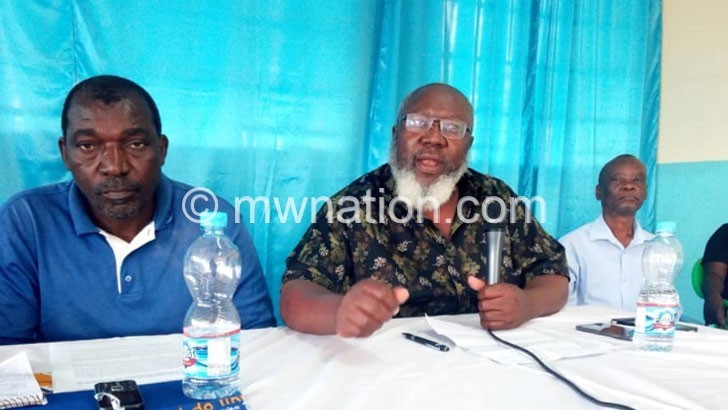Fresh move to oust Malasa
Some parishioners in the Anglican Diocese of the Upper Shire (Adus) on Saturday underlined their resolve to remove Bishop Brighton Malasa from his position for flouting recruitment procedures and wasting church resources, among others.
The group, led by Professor Leonard Kalindekafe, claims to represent 35 of the diocese’s 41 parishes at a press conference held at St George’s Parish in Zomba where it announced that they are planning to occupy the parish’s headquarters to force the bishop out if he does not voluntarily step down from his position.
They further demanded the convening of an emergency synod meeting and institution of a forensic audit into the accounts and assets of the diocese.
According to Kalindekafe, the petitioners were fed up with alleged unending corporate governance lapses within the church.

He said: “What we are saying is that the church is not a personal estate. Therefore, it should not be personalised. Two critical issues that have made us reach this stage was Bishop Malasa’s engagement of his personal secretary to become the diocesan secretary. Another one is the bypassing of governance structures such as his monopolising of church boards heads.”
In his remarks, director of publicity for the group John Awadi doused any hopes for a negotiated settlement on the matter.
He said representatives of 35 parishes recently met at Liwonde in Mangochi where they agreed to push for the removal of the bishop by holding vigils at Adus headquarters if their calls were not considered.
Said Awadi: “We have observed that Bishop Malasa has not been honest in his pronouncements to reconcile. As we speak, some of the clergy are answering cases in court from the same issue. We have, therefore, resolved to ask him to resign willingly or be forced to abdicate.”
Attempts to speak to Bishop Malasa were unsuccessful as he said he was travelling on Saturday and did not pick our call yesterday.
But he was quoted on State-owned Malawi Broadcasting Corporation (MBC) a few weeks ago as having said the healing process in the church was progressing well.
The squabbles, which emerged last year, reached a crescendo in February after a meeting convened by the provincial head of the church Archbishop and Primate of the church in Central Africa Albert Chama failed to break the standoff.
During the meeting, Chama told representatives of the disgruntled parishioners he could not remove Malasa without following the church’s canon laws.
This was after the parishioners locked the bishop’s office at Chilema in Zomba before forcing him to receive a petition demanding his resignation.
On February 28, the High Court in Blantyre dismissed a case in which executive committee members of St George Parish sought an order restraining Malasa from transferring their priest.
The members were also seeking an order restraining Malasa from prohibiting all Anglican priests and bishops from administering at the church, arguing that Malasa’s decision violated their constitutional right and freedom to worship.
But Malasa argued through his lawyer that he was not the right party to the matter as he made the decision on behalf of the diocese, a corporate entity under the Trustees Incorporation Act which is capable of suing and being sued.
Among other issues the parishioners are accusing Malasa of misappropriating funds from foreign partners, misprocurement and mistreatment of parish priests.
The developments have affected church operations, according to Bishop Emeritus Jack Biggers who formerly headed the diocese of Northern Malawi.
He said in a telephone interview yesterday: “Normally there is a church council led by people knowledgeable with legal issues that sits down to find a solution. But what is currently happening at Adus is embarrassing. Common Christians are failing even to access communion, that is unheard of.”
The Upper Shire Diocese is considered the richest in the Anglican Church in Malawi as it boasts of several schools, health facilities and a training centre which it jointly runs with the Church of Central African Presbyterian.





